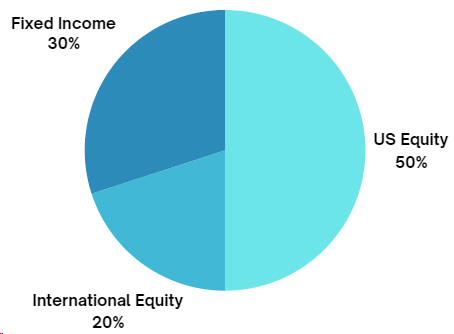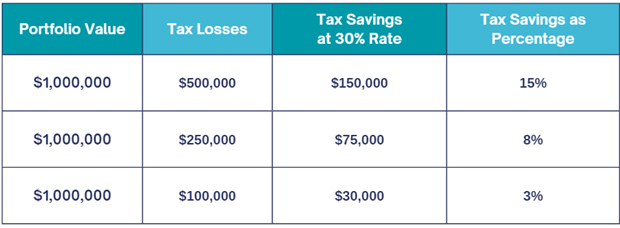Keeping Your Gains with Tax Losses
By Michael McKeown, CFA, CPA - Chief Investment Officer

Imagine that great news comes from a client – the business is finally selling. The bad news – they have to pay taxes. The next question: How do I avoid taxes?
There are a few ways, but one is to have capital tax losses. These losses can be used to offset capital gains from a large transaction. Alternatively, the tax losses can be carried forward to future years when other portfolio holdings generate capital gains.
Of course, we would prefer not to lose capital to have those booked. What if the largest piece of your portfolio could help?
A typical portfolio has the largest weight in US Equities. Below is a basic allocation with 50% held in US equities.

What if we turned the largest allocation into an asset that generates tax losses?
One can do this using an index-based approach. A stock index tracks a collection of stocks, such as the S&P 500 Index, which tracks the largest companies in the US.
Indexing stocks began in 1970 with institutions. In 1975, the first index-based mutual fund was launched. In 1993, the first exchange traded fund (ETF) was launched to track the S&P 500 Index. Our firm began using separate accounts, or direct indexing, over a decade ago with a third-party manager. To lower fees in 2019, we began managing these portfolios in-house.
Today, there are opportunities to add greater gross exposure to create the opportunity to book more losses for tax purposes. In addition, one can run these at different risk levels, at, say, half or even lower for those that prefer less exposure to market volatility. This can be changed over time to meet the target allocation.
The savings from avoiding taxes can be significant. For example, if $500,000 is taken in losses over a few years, this can save $150,000 in taxes. On a $1 million portfolio, this means additional capital of 15%.

Direct indexing has other benefits beyond tax efficiency.
- Customization – Investors can control exposure based on their preferences by choosing which stocks, industries, or sectors to include or exclude. This could be based on an investor’s investment views or values.
- Risk Management – Diversifying exposure by owning stocks tailored to an investor’s risk and investment objectives can more closely align with a long-term financial plan and allocation goal.
- Transition – With concentrated positions or a portfolio with unrealized gains, investors can potentially move a portfolio closer to the benchmark while minimizing tax consequences.
- Charitable giving – A tax-efficient way to support causes by gifting appreciated stock.
A direct indexing approach has risks. This includes tracking error or the variation of returns around the index. In addition, there is risk of executing the strategy without proper tools and software.
Direct indexing can potentially improve the tax efficiency of a portfolio. The strategy works well before or after a personal transaction or as a transition plan for a fully invested portfolio. There are risks to be mindful of, but increasing the total capital base while being mindful of taxes will not go out of style.
Important Disclosure Information
Marcum Wealth, LLC (“Marcum”) is an investment adviser registered with the United States Securities and Exchange Commission. Registration as an investment adviser does not imply a specific level of skill or training. A copy of Marcum’s current written Disclosure Brochure discussing its advisory services, fees, and material conflicts of interest is available upon request.
Past performance does not guarantee future results. Different types of investments involve varying degrees of risk, and there can be no assurance that the future performance of any specific investment, investment strategy, or product (including the investments and/or investment strategies recommended or undertaken by Marcum), or any non-investment related content, made reference to directly or indirectly in this communication, will be profitable, equal any corresponding historical performance level(s), be suitable for your portfolio or individual situation, or prove successful. Certain strategies and vehicles referenced in this communication, such as private investments, Opportunity Zones, and ESG investing, may present increased or novel risks, including potentially higher management fees, reduced liquidity, shorter performance histories, or increased legal or regulatory exposure, compared to more traditional publicly traded securities and investment strategies. All investors should consider these potential risks in light of their individual circumstances, objectives, and risk tolerance. Due to various factors, including changing market conditions and/or applicable laws, the content may no longer be reflective of current opinions or positions. Moreover, you should not assume that any discussion or information contained in this commentary serves as the receipt of, or as a substitute for, personalized investment advice from Marcum. The asset allocations reflected in this communication are targets only. Actual allocations can and often will deviate from these targets, including in instances of volatile markets, large deposits or withdrawals, or during account rebalancing.
Historical performance results for investment indices, benchmarks, and/or categories have been provided for general informational/comparison purposes only, and generally do not reflect the deduction of transaction and/or custodial charges, the deduction of an investment management fee, nor the impact of taxes, the incurrence of which would have the effect of decreasing historical performance results. It should not be assumed that your Marcum account holdings correspond directly to any comparative indices or categories. Please Also Note: (1) performance results do not reflect the impact of taxes; (2) comparative benchmarks/indices may be more or less volatile than your Marcum accounts; and (3) a description of each comparative benchmark/index is available upon request.
Not all services described herein will be necessary or appropriate for all clients. The scope of the services to be provided depends upon the needs of the client and the terms of the engagement. The potential value and benefit of the adviser’s services will vary based upon a variety of factors, such as the client’s investment, tax, and financial circumstances, and overall objectives. Neither personalized services nor financial or professional resources or processes should be construed as a guarantee of a particular outcome. All investing comes with risk, including risk of loss.
If you are a Marcum client, please remember that it remains your responsibility to advise Marcum, in writing, if there are any changes in your personal/financial situation or investment objectives for the purpose of reviewing/evaluating/revising our previous recommendations and/or services, or if you would like to impose, add, or to modify any reasonable restrictions to our investment advisory services. Unless, and until, you notify/advise us, in writing, to the contrary, we shall continue to provide services as we do currently. Marcum is neither a law firm, nor a certified public accounting firm, and no portion of the commentary content should be construed as legal or accounting advice. Tax and accounting services provided by Marcum, LLP. Insurance services provided by Marcum Insurance Services, LLC.
